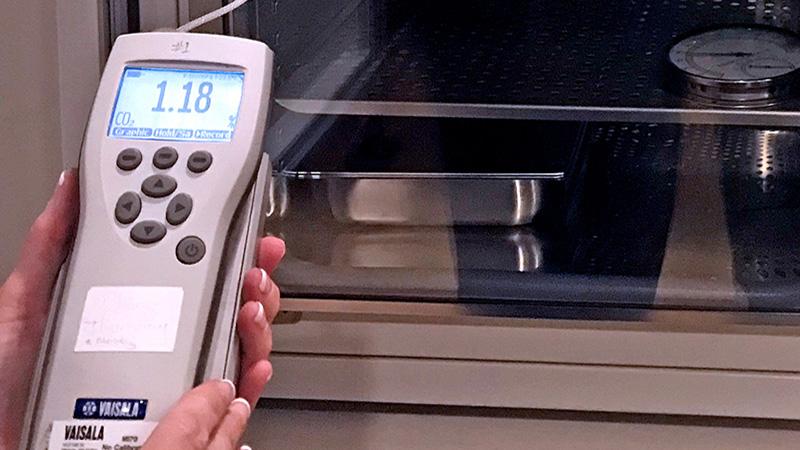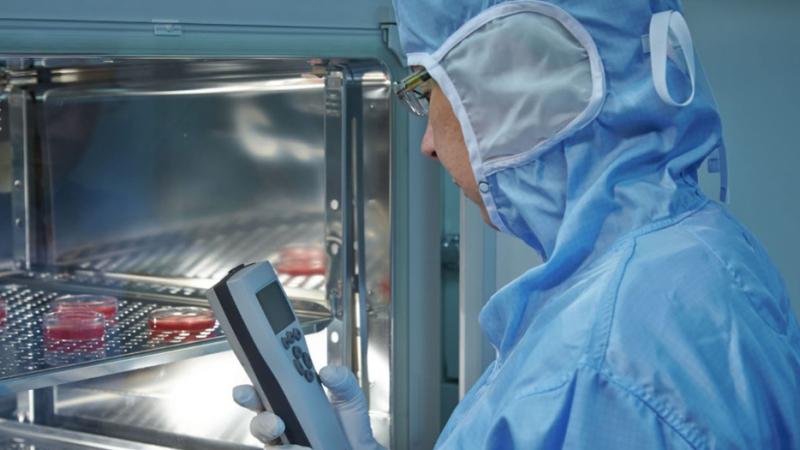Boston IVF ensures ideal CO2 for embryos in assisted reproduction with Vaisala calibration
Boston IVF provides Assisted Reproductive Technology including in vitro fertilization (IVF) in 28 locations throughout the greater Boston area. Since 1986, reproductive treatment through Boston IVF has resulted in 90,000 births. Boston IVF’s embryo incubators are one of the most important pieces of equipment at their facilities.
Pam Jarmuz, Chief Embryologist at Boston IVF Waltham Fertility Center, says: “We monitor temperature, humidity, and pH to ensure an ideal environment for the embryos. The pH levels during incubation are an important measurement obtained by monitoring the concentration of carbon dioxide in the chambers because pH levels are dependent on the CO2 levels.” However, as with any parameter, an indirect measurement means the sensor needs to be highly accurate to de-emphasize uncertainties in the measured value.
Daily checking of the chambers with Vaisala’s handheld meters ensures that any drift in the accuracy of incubators' built-in sensors is detected immediately. Most incubator sensors are calibrated to a single-point so a more accurate measurement is required to make any needed adjustment to CO2 levels. For daily quality control Boston IVF uses the GM70 Handheld Carbon Dioxide Meter equipped with CARBOCAP® sensors.
“Ideal conditions for IVF incubators are: 37°C temperature, 85% to 100% relative humidity, and 6.8 to 7.2% CO2 which keeps the pH of media between 7.2 and 7.4. Although we use the highest quality incubators equipped with sensors, we check the incubators daily, record the levels, and make any adjustment to each chamber’s carbon dioxide level according to the Vaisala meter’s highly accurate measurement.”
- Pam Jarmuz, Chief Embryologist, Boston IVF Waltham Fertility Center
Innovative CO2 technology
In CO2 sensors, humidity and heat are the enemy of accuracy. Vaisala has developed non-dispersive infrared (NDIR) CO2 sensor technology to measure carbon dioxide in harsh or humid conditions. In NDIR sensors, as light passes through a tube, gas molecules that are the same size as the wavelength of the infrared light absorb that light only, ignoring other wavelengths. Vaisala simplified this technology with its proprietary Microglow IR source, which has a long lifespan and requires very little power. The Microglow light source is integrated into the Vaisala CARBOCAP® carbon dioxide sensor, which provides both ppm and percentage-level CO2 measurement and has minimal maintenance and calibration requirements.
CARBOCAP® features a unique electrically tunable Fabry-Perot Interferometer (FPI) filter for dual-wavelength measurement. This means that in addition to measuring CO2 absorption, the CARBOCAP® sensor also performs a reference measurement, which compensates for any changes in the light source intensity, as well as for any accumulation of contaminants. This makes the sensor extremely stable over time – ideal for spot-checking incubators that require an accurate CO2 measurement.
Meeting regulatory needs with calibration service
“We have several regulatory and accreditation bodies that audit our operations,” says Jarmuz. “We are registered with and inspected by the FDA, accredited by CAP, and certified by the Society for Reproductive Technology among others.”
Reproductive tissues are regulated as human cells, tissues, and cellular and tissue-based products (HCT/Ps). Organizations that handle, process, store, or distribute HCT/Ps must register with the FDA and comply with Title 21 Code of Federal Regulations (CFR) Part 1271. The College of American Pathologists (CAP) provides accreditation for reproductive laboratories in collaboration with the American Society for Reproductive Medicine. Boston IVF is regularly inspected by CAP as part of their accreditation program.
“We are inspected once a year at least and it’s important that we have complete documentation of our incubators’ conditions and calibration records for all equipment,” says Jarmuz. “Very occasionally we may get a CO2 reading on an incubator’s internal sensor that differs from the Vaisala meter. We immediately move the media to an empty chamber that is showing the correct values and then monitor the fluctuating chamber to see if the levels equilibrate.
"We keep checking the chamber with our Vaisala handheld and if the CO2 levels continue to fluctuate, we have a technician service the incubator. It’s sometimes an electronic issue such as the motherboard. But the Vaisala meter is the first line of defense in preventative maintenance, so we make sure the handhelds are calibrated on schedule.”
Calibration care
Vaisala calibration labs are accredited to ISO/IEC 17025; A2LA accreditation in the US and FINAS in Finland. “Vaisala calibration service is fast and easy and we appreciate the process as a convenient way to keep our meters accurate,” says Jarmuz. “Our incubators are critical to our services and Vaisala adds value to our operations.”
In 2015, Boston IVF was designated by The Clinical Sciences Institute of Optum as an Infertility Center of Excellence for exemplifying clinical excellence in assisted reproductive technology. This honor is earned by having exceeded best-in-class patient care, quality guidelines, and clinical outcomes. Boston IVF is creating and growing families every year with cutting-edge technology and Vaisala calibration services to ensure ideal conditions in incubation chambers that hold the hopes of thousands of couples in and around Boston.
“We use Vaisala calibration services because it’s the simplest way to ensure our CO2 measurements are reliable. We prefer dealing with the manufacturer of the instrument because if there was ever an issue with the device, they can fix it. Vaisala makes it easy for us: we use the online store to order and the turn-around time is only a few days.”
- Pam Jarmuz, Chief Embryologist, Boston IVF Waltham Fertility Center




